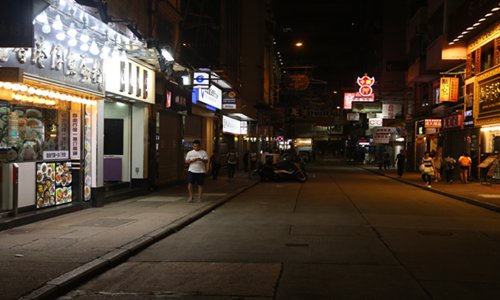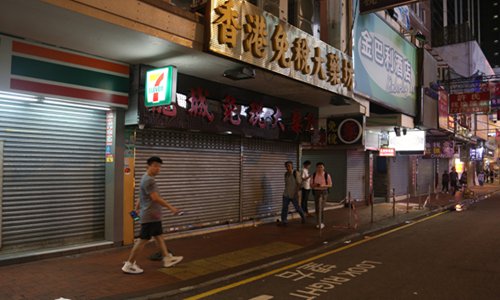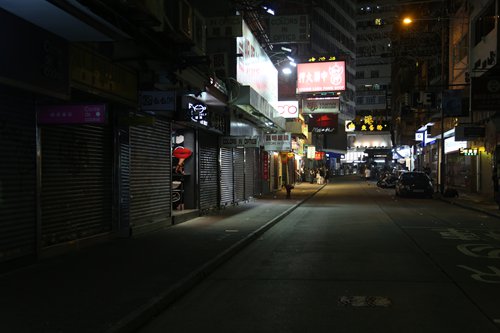HOME >> BUSINESS
Hong Kong catering sector badly hit by violent protests
By Wang Wenwen, Chen Qingqing and Lu Wenao in Hong Kong Source:Global Times Published: 2019/8/25 20:48:40

Shops and restaurants in the Tsim Sha Tsui business district closed after a violent protest during a weekend in August which used to be the peak time for shoppers and diners. Photo: Chen Qingqing/GT

Shops and restaurants in the Tsim Sha Tsui business district closed after a violent protest during a weekend in August which used to be the peak time for shoppers and diners. Photo: Chen Qingqing/GT

Shops and restaurants in the Tsim Sha Tsui business district closed after a violent protest during a weekend in August which used to be the peak time for shoppers and diners. Photo: Chen Qingqing/GT
The ongoing protests in Hong Kong have taken their toll on the city's catering industry, a local survey showed, and people in the sector said they have already felt the chill.
The Eating Establishment Employees General Union of Hong Kong recently surveyed more than 500 restaurant employees and 90 percent of respondents said the restaurants they work for have been affected by the current social unrest in Hong Kong.
A weakening global economy and a series of protests that have escalated to violent attacks since June have left many restaurant employees facing unprecedented challenges, according to a statement the union sent to the Global Times on Friday.
The survey showed that 98 percent of respondents believed the protests were weighing on their businesses, and 47 percent said the revenue of their companies slumped more than 30 percent lately. The survey also found that 51 percent planned to cut jobs to tackle rising operational difficulties.
The union said that during the past two months, it has handled dozens of cases of restaurant closures. These restaurants were located in various parts of the city and the closures involved more than 700 people and led to the losses of nearly millions of Hong Kong dollars.
A businessman who runs a clay pot rice restaurant in Mong Kok told the Global Times that summer is usually the peak tourism season, and many tourists used to line up at his restaurant every night until 10 pm.
"It's very disappointing this year, you can see. We close the doors around 9 pm as we receive very few people every night now," he said.
During the weekends, the restaurant has to shut its doors even earlier, as black-clad protesters come to the neighborhood and illegally occupy the streets, which has led to a series of intense standoffs with police.
Xie Yanli works at a restaurant in Mong Kok. She has been a waitress for more than 10 years. She said that she has been affected due to the decline in business caused by the protests.
In the past, customers would have to line up outside her restaurant at peak times, but now the average daily revenue of her restaurant is less than the lunch time earnings in the past.
Xie told the Global Times that she used to take one day off per week, but now she has to take two or three days off given the uncertainties.
"Sluggish business across the industry has forced many people to leave, pushing up the unemployment rate. However, many youngsters do not realize this and do not value what they have got," Xie said.
Hong Kong's economic growth is mainly driven by the services sector. As one of the pillars in the services sector, catering is facing an unemployment crisis due to the anti-government movement.
From May to July, the unemployment rate in the restaurant business reached 5 percent, involving 12,900 people. This was much higher than the city's overall unemployment rate of 2.9 percent, making it the sector with the highest unemployment rate, the statement showed.
The union said it considers the current situation to be the worst ever seen, and it called for the restoration of peace and normality.
Moreover, the sweeping protests have also cast a shadow on other sectors such as retail.
A man in his 50s has run a retail stall at Victoria Harbour for more than 10 years. He told the Global Times that most of the tourists he sees are from the Chinese mainland, but since the massive protests began in late June, few people are coming.
He said that his daily sales have dropped nearly two thirds, from almost HK$2,000 ($255) to only about HK$700, 30 percent of which is his net income.
"We are the victims, but we cannot do anything about it," he said.
A salesperson at a Chow Tai Fook store on Nathan Road, the main artery of the bustling Tsim Sha Tsui shopping area, told the Global Times that the store would definitely close earlier if there is a violent protest. The store normally closes at 10 pm.
Posted in: ECONOMY,BIZ FOCUS